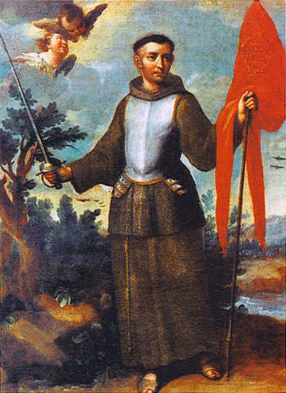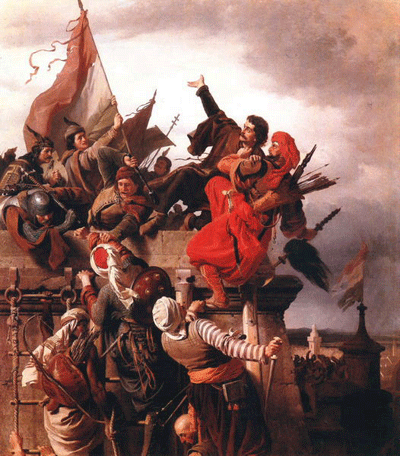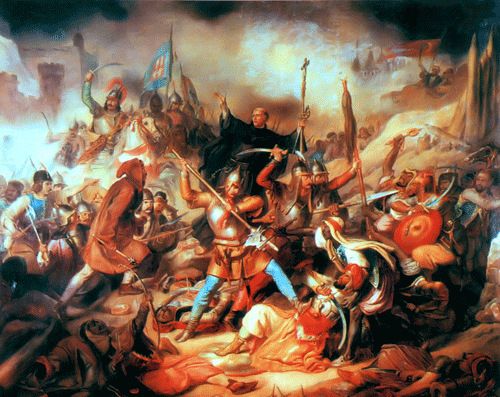

The nearer the Church approaches to the end of Her earthly existence, the more She seems to love to enrich Her cycle with Feasts that recall the glorious past. Indeed, one of the objects of the sacred Liturgy is to keep before our minds all that God has done for us. Remember the days of old: think upon every generation (Deut. 32: 7), said God to His people in the alliance of Sinai. It was a law in Jacob that the fathers should hand on these traditions to their children, who were in their turn to transmit them to their descendants (Ps. 77: 5). The Church has taken the place of the ancient Israel and Her annals speak, even more than those of the Jewish people, of the manifestations of Divine power. The children of the new Sion have more right than the sons and daughters of Juda to say, as they look back on the past: Thou art Thyself my King and my God, Who commandest the saving of Jacob.
At the time when the defeat of the Iconoclasts was being completed in the East, a new and most terrible war was beginning in which the West was to fight for the sake of civilization and for the cause of the Incarnate Word of God. Like a sudden torrent, Islam overwhelmed Eastern Europe, reaching even to Gaul, and for a thousand years it disputed, foot by foot, with Christ and His Church, the land occupied by the Latin races. The glorious Crusades of the 12th and 13th centuries, which attacked this power in its very center, only succeeded in paralyzing it for the time being. In Spain the struggle continued until the triumph of the Cross was complete, but in other parts of Europe Christian princes forgot the traditions of St. Karl the Great (Charlemagne) and St. Louis, grew weary of the holy war, and gave themselves up to the pursuit of their private ambition, so that the Crescent was able once more to defy the Christian powers and renew its plan of universal conquest.
In 1453 Byzantium, the captial of the Eastern empire, fell before the Turkish janissaries, and three years later Mahomet II invaded Belgrade on the very outskirts of the Western empire. It might have been expected that all Europe would hasten to the aid of the besieged fortress, for if this last dyke were to fall, Hungary, Austria and Italy would be overwhelmed and the peoples of the North and West would share the fate of the East—that life in death, that irremediable sterility of soil and intelligence which still holds captive the once brilliant Greece. But this imminent danger only resulted in deepening the breech in Christian unity, and the Christian nations were at the mercy of a few thousand infidels. Only the Papacy was true to itself in the midst of all this egotism and perfidy. Truly Catholic in its thoughts, its labors, its sufferings, as in its joys and triumphs, it took up the common cause which had been basely betrayed by kings and princes. The powerful were deaf to the Pope’s appeals, but he turned to the humble, and trusting more in prayer to the God of armies than in military tactics, he sought for the deliverers of Christendom among the poor.

Christians repel the Turks in the Siege of Belgrade.
It was then that the Saint of today, John Capistrano, attained the consummation of his glory and his sanctity. At the head of a few poor men of good will, unknown peasants gathered together by the Franciscan Friars, this "poor man of Christ" undertook to defeat the strongest and best organized army of the century. On July 14, 1456, he broke through the Ottoman lines with John Hunyades, the only one of the Hungarian nobles who would accompany him, and resupplied Belgrade; and on July 22, feeling that he could no longer endure the defensive, he threw himself, to the stupefaction of Hunyades, on the enemy entrenchments. His troops were armed with flails and pitchforks, and their only strategy was the Name of Jesus. St. John had inherited this victorious battle-cry from his master, St. Bernardine of Siena. The Psalmist had said: Some trust in chariots and some in horses: but we will call upon the Name of the Lord our God (Ps. 19: 8). This Name, so holy and so powerful, proved once more the salvation of the people. At the end of that memorable day 24,000 Turks lay dead on the field of battle; 300 cannon and all the spoils of the infidels were in the hands of the Christians, and Mahomet II was seeking a distant hiding-place for his shame. The news of this victory, so like that of Gedeon, reached Rome on August 6, and Pope Callistus III decreed that thenceforth the Universal Church should keep a solemn commemoration of the Transfiguration of Our Lord on that day, for it was with the soldiers of the Cross as with the heroes of Israel: they got not the possession of the land by their own sword: neither did their own arm save them, but Thy right hand and Thy arm and the light of Thy countenance, because Thou wast pleased with them (Ps. 43: 4-5), as with Thy Beloved Son on Mount Tabor (Matt. 17: 5).
Let us read the life of St. John Capistrano as related in the Liturgy:

St. John Capistrano leads the Christian forces in the Battle of Belgrade.
St. John was born at Capistrano in the Abruzzi. He was sent to study at Perugia, and made such progress in learning, both sacred and profane, that on account of his eminent knowledge of law, he was made governor of many cities by Ladislaus, King of Naples. He was laboring piously to restore peace to these troubled states when he was kidnapped and put in chains. He was miraculously delivered from this captivity and made his profession according to the Rule of St. Francis of Assisi among the Friars Minor. He devoted himself to the study of Divinity and had as master St. Bernardine of Siena, whom he zealously imitated in spreading devotion to the Most Holy Name of Jesus and to the Mother of God. He refused the bishopric of Aquila, and is most famous on account of his mortified life and his writings on the reformation of morals.
He zealously devoted himself to preaching the Word of God and travelled throughout nearly all Italy, where he recalled countless souls to the way of salvation by the power of his words and the number of his miracles. Pope Martin V made him Inquistor against the sect of the Fraticelli and Pope Nicholas V appointed him Inquistor-General in Italy, against Judaism and Mohammedanism. He converted many souls to the Faith of Christ. He did much good in the East and at the Council of Florence, where he shone like a sun, he brought the Armenians back to the Catholic Church. The same Pope, at the request of the Emperor Frederic III, sent him into Germany as Nuncio of the Apostolic See, in order that he might bring back heretics to the Catholic Faith, and the minds of princes to peace and unity. He did a wonderful work for God’s glory during the six years of his mission, and brought back to the Church by the light of his teaching and miracles almost countless numbers of Hussites, Adamites, Thaborites, and Jews.
It was mainly at the entreaty of St. John that Pope Callistus III proclaimed a crusade, and St. John hastened through Pannonia and other provinces where by his words and letters he so roused the minds of princes that in a short time 70,000 Christians soldiers were enrolled. It was mainly through his advice and courage that a victory was gained at Belgrade, where 120,000 Turks were either slain or put to flight. The news of this victory reached Rome on the 6th of August, and Pope Callistus consecrated this day forever to the solemn commemoration of the Transfiguration of Our Lord. When St. John was seized with his last illness and taken to Illak, many princes came to see him, and he exhorted them to protect religion. He piously yielded up his soul to God in the year of salvation 1456. God confirmed his glory by many miracles after his death, and when these had been duly approved, Pope Alexander VIII enrolled his name among those of the Saints. 200 years later Pope Leo XIII extended his Office and Mass to the Universal Church.
Contact us: smr@salvemariaregina.info
Visit also: www.marienfried.com